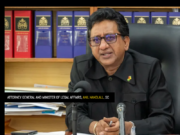The public service has long played a crucial role in enabling efficient government functions and delivering essential services to its citizens. However, as the country continues to evolve, concerns have been raised about the fairness and adequacy of remuneration for public servants. To tackle this issue, local Financial Analyst, Surendra Boodhoo, has proposed a revision of pay grades to foster motivati9on, attract talent, and maintain a skilled workforce.
Boodhoo’s recent analysis pointed out that the existing pay grade system may have been designed with good intentions, but it has gradually become outdated and insufficient in meeting the needs of the workforce. Over time, inflation, rising living costs, and market pressures have eroded the purchasing power of public servants’ salaries, leading to decreased job satisfaction and morale among the workforce.
According to Boodhoo, “insufficient pay can hinder the government’s ability to attract and retain skilled individuals in vital positions, leading to a potential brain drain and reduced efficiency within public institutions.” In light of these challenges, he stressed the urgency of conducting a comprehensive salary survey in collaboration with relevant stakeholders. Such a survey should encompass various factors, including living costs, inflation rates, job responsibilities, educational qualifications, and comparative remuneration in the private sector. The data collected from this survey would lay the foundation for a fair and evidence-based revision.
One of the key recommendations put forth by Boodhoo is the implementation of skill-based and performance-linked pay structures. By rewarding public servants with specialized skills or certifications that significantly contribute to their roles, the government can promote higher levels of dedication and productivity. Moreover, he said incorporating performance-linked incentives can further motivate employees to strive for excellence and improve overall efficiency within the public service.
To ensure the revised pay grades remain relevant and adequate, Boodhoo emphasized the necessity of regular adjustments based on inflation rates and the cost-of-living index. These adjustments would protect public servants’ purchasing power and ensure that their earnings remain stable over time, despite economic fluctuations.
Additionally, Boodhoo stressed the importance of recognizing the value of experience and tenure within the public service. Long-serving public servants, who have dedicated their careers to serving the nation, deserve acknowledgment and fair compensation for their loyalty and accumulated expertise.
Gender equity was also a significant concern raised by Boodhoo. He underscored the importance of scrutinizing pay grades to identify and rectify any gender-based pay disparities. Equal pay for equal work, he argued, not only ensures fairness but also contributes to fostering a diverse and inclusive public service.
In line with the proposed revisions, Boodhoo advocated for enhancing benefits and perks to augment the overall job satisfaction and well-being of public servants. By improving benefits such as healthcare coverage and retirement plans, the government can further motivate its workforce and enhance loyalty.
To implement the revised pay grades effectively, Boodhoo recommended a phased approach. This strategy would enable the government to manage the financial implications and monitor the impact of the changes, making necessary adjustments along the way.













